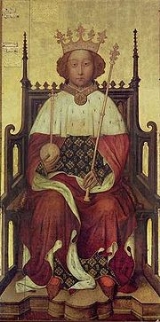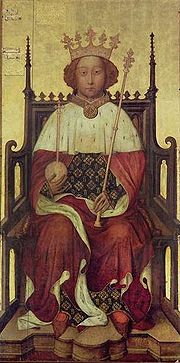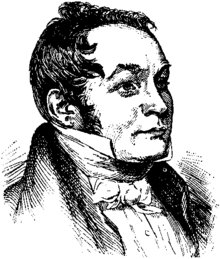
College of Minor Canons
Encyclopedia
The Minor Canons of St Paul's Cathedral
, London
, whose origins predate the Norman conquest of England
, unusually were independent of the senior canons
and, as priests, of higher status than the lay vicars choral. Medieval Hereford
furnishes the only other example of such a structure. The College of Minor Canons of St Paul's Cathedral still exists today, as do two historic positions styled Senior Cardinal and Junior Cardinal.
 The college of minor canons (twelve in number) lived according to a Rule and from 1353 possessed a hall where they gathered daily for an evening meal. In 1378 the minor canons petitioned Pope
The college of minor canons (twelve in number) lived according to a Rule and from 1353 possessed a hall where they gathered daily for an evening meal. In 1378 the minor canons petitioned Pope
Urban VI for a grant confirming their ‘ancient’ privileges, and in 1396 King Richard II
authorised statutes to govern the college of minor canons at St Paul’s.
The 1396 statutes (which probably reflected contemporary practice) provided for the election by the minor canons each June of a warden, who was to govern the college in association with his senior brethren, among them the Junior and Senior Cardinals. Whenever a vacancy arose in the college, the remaining members were to nominate two persons, from whom the dean and chapter made their selection. Prospective minor canons were to be "worthy, sufficient and meet men, not only in reading and singing, but also and especially in honesty of life and godliness of conversation". Upon election each new minor canon was to present the college with a silver spoon worth at least five shillings. To avoid scandal, canons were forbidden to bring women into the college precincts or to visit taverns in their company. Transgressors faced expulsion for a third offence. Hospitality was limited, for any legitimate guests at dinner were to pay a sum set by the warden "as the dearth or plenty of victuals then requires". Tranquillity was also important, for there was to be no noise in minor canons' residences after 9 pm. Sanitation was a constant concern, with a ha’penny
fine for any minor canon who did "cast filth . . . [or] make water within the gates except it be in the place appointed for that purpose". These statutes of 1396 were confirmed by successive monarchs, as by Henry VII
in 1487 and Elizabeth I in 1566. In 1840 an Act of Parliament
, known as the St Paul’s Cathedral Minor Canonries Act reduced the number of Minor Canons to six, with a Warden, and a Senior and Junior Cardinal among them. The College of Minor Canons of St Paul's Cathedral still exists today, with three serving priests, as Chaplain
, Sacrist and Succentor
. They are responsible for singing services and organising large and small scale services in the cathedral.
 In the Church of England
In the Church of England
, the title Cardinal is applied to the two senior members of the College of Minor Canons of St Paul's Cathedral. They are known as the Senior and Junior Cardinal. The use of the term predates the English Reformation
and in 1898 a complete list of the Cardinals up to that time appeared in print. The current incumbents are Revd Jason Rendell (Sacrist) and Revd Andrew Hammond (Succentor). They are the only clerics entitled to use the title Cardinal in the Church of England, Three previous incumbents - Revd Lucy Winkett
, Revd Laura Burgess and Revd Claire Robson - were the only female Cardinals in all of Christianity.
sung in the cathedral. They were consulted on liturgical
matters, as on the suitability of the office hymn Verbum supernum at the time of the introduction of the Sarum Rite
at St Paul's
in the mid-fifteenth century. Their duty to celebrate at the high altar in place of the dean and canons
was unique to St Paul's. Moreover, the junior Cardinal had special responsibility for visiting the sick and ministering the sacrament to them: a dangerous duty when the city was infected by plague and disease. In reward, the Cardinals enjoyed a double allowance of money, bread, and ale from the college common funds. The Victorian
poet Richard Harris Barham
held one of these offices.
St Paul's Cathedral
St Paul's Cathedral, London, is a Church of England cathedral and seat of the Bishop of London. Its dedication to Paul the Apostle dates back to the original church on this site, founded in AD 604. St Paul's sits at the top of Ludgate Hill, the highest point in the City of London, and is the mother...
, London
London
London is the capital city of :England and the :United Kingdom, the largest metropolitan area in the United Kingdom, and the largest urban zone in the European Union by most measures. Located on the River Thames, London has been a major settlement for two millennia, its history going back to its...
, whose origins predate the Norman conquest of England
Norman conquest of England
The Norman conquest of England began on 28 September 1066 with the invasion of England by William, Duke of Normandy. William became known as William the Conqueror after his victory at the Battle of Hastings on 14 October 1066, defeating King Harold II of England...
, unusually were independent of the senior canons
Canon (priest)
A canon is a priest or minister who is a member of certain bodies of the Christian clergy subject to an ecclesiastical rule ....
and, as priests, of higher status than the lay vicars choral. Medieval Hereford
Hereford
Hereford is a cathedral city, civil parish and county town of Herefordshire, England. It lies on the River Wye, approximately east of the border with Wales, southwest of Worcester, and northwest of Gloucester...
furnishes the only other example of such a structure. The College of Minor Canons of St Paul's Cathedral still exists today, as do two historic positions styled Senior Cardinal and Junior Cardinal.
History

Pope
The Pope is the Bishop of Rome, a position that makes him the leader of the worldwide Catholic Church . In the Catholic Church, the Pope is regarded as the successor of Saint Peter, the Apostle...
Urban VI for a grant confirming their ‘ancient’ privileges, and in 1396 King Richard II
Richard II of England
Richard II was King of England, a member of the House of Plantagenet and the last of its main-line kings. He ruled from 1377 until he was deposed in 1399. Richard was a son of Edward, the Black Prince, and was born during the reign of his grandfather, Edward III...
authorised statutes to govern the college of minor canons at St Paul’s.
The 1396 statutes (which probably reflected contemporary practice) provided for the election by the minor canons each June of a warden, who was to govern the college in association with his senior brethren, among them the Junior and Senior Cardinals. Whenever a vacancy arose in the college, the remaining members were to nominate two persons, from whom the dean and chapter made their selection. Prospective minor canons were to be "worthy, sufficient and meet men, not only in reading and singing, but also and especially in honesty of life and godliness of conversation". Upon election each new minor canon was to present the college with a silver spoon worth at least five shillings. To avoid scandal, canons were forbidden to bring women into the college precincts or to visit taverns in their company. Transgressors faced expulsion for a third offence. Hospitality was limited, for any legitimate guests at dinner were to pay a sum set by the warden "as the dearth or plenty of victuals then requires". Tranquillity was also important, for there was to be no noise in minor canons' residences after 9 pm. Sanitation was a constant concern, with a ha’penny
Half penny
Halfpenny, half penny, or ha'penny may refer to:Coins:* Half penny * Halfpenny * Halfpenny * Halfpenny * Halfpenny...
fine for any minor canon who did "cast filth . . . [or] make water within the gates except it be in the place appointed for that purpose". These statutes of 1396 were confirmed by successive monarchs, as by Henry VII
Henry VII of England
Henry VII was King of England and Lord of Ireland from his seizing the crown on 22 August 1485 until his death on 21 April 1509, as the first monarch of the House of Tudor....
in 1487 and Elizabeth I in 1566. In 1840 an Act of Parliament
Act of Parliament
An Act of Parliament is a statute enacted as primary legislation by a national or sub-national parliament. In the Republic of Ireland the term Act of the Oireachtas is used, and in the United States the term Act of Congress is used.In Commonwealth countries, the term is used both in a narrow...
, known as the St Paul’s Cathedral Minor Canonries Act reduced the number of Minor Canons to six, with a Warden, and a Senior and Junior Cardinal among them. The College of Minor Canons of St Paul's Cathedral still exists today, with three serving priests, as Chaplain
Chaplain
Traditionally, a chaplain is a minister in a specialized setting such as a priest, pastor, rabbi, or imam or lay representative of a religion attached to a secular institution such as a hospital, prison, military unit, police department, university, or private chapel...
, Sacrist and Succentor
Succentor
The Succentor in an ancient cathedral foundation sings psalms and Preces and Responses after the Precentor. In English cathedrals today the priest responsible for liturgy and music is usually the Precentor, but some cathedrals, such as St Paul's and Durham, retain a Succentor as well. Westminster...
. They are responsible for singing services and organising large and small scale services in the cathedral.
Cardinals

Church of England
The Church of England is the officially established Christian church in England and the Mother Church of the worldwide Anglican Communion. The church considers itself within the tradition of Western Christianity and dates its formal establishment principally to the mission to England by St...
, the title Cardinal is applied to the two senior members of the College of Minor Canons of St Paul's Cathedral. They are known as the Senior and Junior Cardinal. The use of the term predates the English Reformation
English Reformation
The English Reformation was the series of events in 16th-century England by which the Church of England broke away from the authority of the Pope and the Roman Catholic Church....
and in 1898 a complete list of the Cardinals up to that time appeared in print. The current incumbents are Revd Jason Rendell (Sacrist) and Revd Andrew Hammond (Succentor). They are the only clerics entitled to use the title Cardinal in the Church of England, Three previous incumbents - Revd Lucy Winkett
Lucy Winkett
Lucy Winkett is an Anglican priest. She was precentor of St Paul's Cathedral, London before being appointed in 2010 as Rector of St James's Piccadilly. With degrees in history, music and theology, she writes, speaks and debates on a wide range of issues reflecting on culture, gender and religion...
, Revd Laura Burgess and Revd Claire Robson - were the only female Cardinals in all of Christianity.
History of the title
A papal grant of Urban VI (1378) referred to duo deputati ab antiquo, qui cardinales vocantur, the two who took a leading role in the affairs of the college. Their duties according to the statutes of the cathedral of 1396 were "continually to visit the sick and minister unto them as often as shall be needful". The two Cardinals of the choir enjoyed fees from funerals and anniversary MassesMass (liturgy)
"Mass" is one of the names by which the sacrament of the Eucharist is called in the Roman Catholic Church: others are "Eucharist", the "Lord's Supper", the "Breaking of Bread", the "Eucharistic assembly ", the "memorial of the Lord's Passion and Resurrection", the "Holy Sacrifice", the "Holy and...
sung in the cathedral. They were consulted on liturgical
Liturgy
Liturgy is either the customary public worship done by a specific religious group, according to its particular traditions or a more precise term that distinguishes between those religious groups who believe their ritual requires the "people" to do the "work" of responding to the priest, and those...
matters, as on the suitability of the office hymn Verbum supernum at the time of the introduction of the Sarum Rite
Sarum Rite
The Sarum Rite was a variant of the Roman Rite widely used for the ordering of Christian public worship, including the Mass and the Divine Office...
at St Paul's
St Paul's Cathedral
St Paul's Cathedral, London, is a Church of England cathedral and seat of the Bishop of London. Its dedication to Paul the Apostle dates back to the original church on this site, founded in AD 604. St Paul's sits at the top of Ludgate Hill, the highest point in the City of London, and is the mother...
in the mid-fifteenth century. Their duty to celebrate at the high altar in place of the dean and canons
Canon (priest)
A canon is a priest or minister who is a member of certain bodies of the Christian clergy subject to an ecclesiastical rule ....
was unique to St Paul's. Moreover, the junior Cardinal had special responsibility for visiting the sick and ministering the sacrament to them: a dangerous duty when the city was infected by plague and disease. In reward, the Cardinals enjoyed a double allowance of money, bread, and ale from the college common funds. The Victorian
Victorian era
The Victorian era of British history was the period of Queen Victoria's reign from 20 June 1837 until her death on 22 January 1901. It was a long period of peace, prosperity, refined sensibilities and national self-confidence...
poet Richard Harris Barham
Richard Harris Barham
Richard Harris Barham was an English cleric of the Church of England, novelist, and humorous poet. He was known better by his nom de plume Thomas Ingoldsby.-Life:Richard Harris Barham was born in Canterbury...
held one of these offices.

